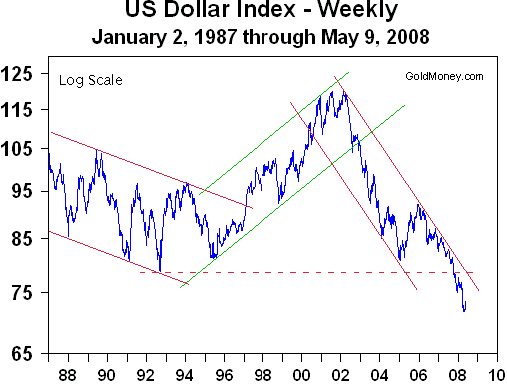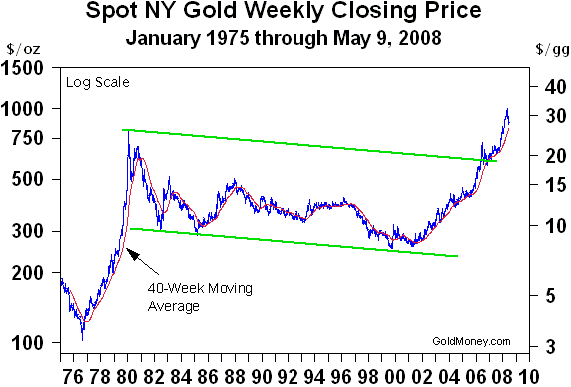Jetzt Euro shorten!
forex trading ist sehr technisch geprägt und du zitierst irgendwelche Japaner....kopfschüttel...das sind also deine "Profis" von denen du so gerne redest...aha!
jetzt warte erst mal die 1,56/57 ab
A Bloomberg/Los Angeles Times poll found that 76 percent of Americans think the government should do something to halt the falling dollar. Among those with incomes of $100,000 or more, seven in 10 favored aiding the currency, putting pressure on Paulson, who's charged with setting the policy, to match his ``strong dollar'' rhetoric with action.
The U.S. currency has slumped 41 percent against the euro since 2002 and 13 percent in the past 12 months alone. That has contributed to a surge in energy and commodity prices to record levels, and prompted central banks to reduce their share of foreign exchange reserves in dollars.
``It's not just the economic impact,'' said Paul Burt, who heads Westlake Financial Group, an employee benefits consulting firm, in Lake Forest, Illinois. ``The perception of the decline in the dollar is as important as the decline itself. The dollar needs to be respected in the world, and the government needs to realize that.''
Burt, 47, had few specific prescriptions for the Bush administration beyond trimming the federal budget and U.S. trade deficits. ``I don't think it can be addressed very easily,'' he said, referring to halting the dollar's drop.
The nationwide poll of 2,208 adults was conducted May 1 to May 8. The sampling error is plus or minus 3 percentage points. There were 650 respondents who earned at least $100,000. The survey noted that economists say a weaker dollar both adds to the cost of imported goods and helps American exports.
ergo: ich muss also nun all mein geld in eur/$ puts stecken, weil Paulson (höre höre) gesagt hat, das man den $ nicht weiter fallen lasse solle :)...das wievielte mal war das schon?
Und Pendulum: deine erwähnung das du DAX puts hast, kommt mir doch recht spanisch vor, dies kurz nach Astrids posting von "Hedging" zu schreiben :) denn das waere in der tat zur zeit eine art Hedge! Gut gemacht würde ich sagen....wenns denn stimmt :)
noch mal 'ne schöne Trading-Chance. Die erste habe ich Depp, obwohl
in der Tendenz €/$ short eingestellt, verppasst wie einer, der sich eine
halbe Stunde vor Abfahrt seines Zuges auf den Bahnsteig stellt und dann
tatenlos dem Pfiff des Schaffners, dem Zuklappen der Türen und dem Anrollen
des Gefährtes hinterher glotzt!
Pendulum, bist wieder im shit gelandet...
bin schon lange nicht mehr auf dieser Seite gewesen, aber wenn ich eur/usd lese, muss ich kotzen. Hatte Ende 2006 bei ca. 1,26 eine Analyse über dieses Währungspaar bekommen.die hatten 1,59 - 1,60 vorhergesagt, obwohl ich für diese Analyse viel Geld bezahlt hatte, (ich depp habe es denen nicht geglaubt) war nur kurz investiert. Ich kann mir dies immer noch nicht verzeihen :-( das wäre jetzt ein hoher 5 stelliger Gewinn gewesen.
PS: die haben das erste mal am 16.04.08 eine Änderung vorgenommen, und die haben meistens Recht behalten.
möchte keine rechtlichen Probleme mit den AGB´s dieser Firma bekommen,
deshalb lieber selber anschauen.Ich habe nichts gesagt :-)
http://www.centralact.com/eurusd.php
hoffe, euch geholfen zu haben
Habe ich die bärischen Aussichten für den Dollar in den letzten Artikeln zu übertrieben dargestellt? Ich denke nicht. Gehe ich immer noch von einer Dollarkrise in diesem Sommer aus? Ja, aber wir brauchen ein neues Tief im US-Dollar-Index, damit sich bestätigt, dass sein kurzfristiger Abwärtstrend bestehen bleibt. Dieses neue Tief wird die bärischen Aussichten für den Dollar erneut bestätigen.
Der folgende Chart des Dollar-Index zeigt, wie schlimm der Dollar abgeschnitten hat.

Seitdem der Dollar-Index sein Hoch im Jahr 2000 erreicht hat, gab es nur noch eine einzige bedeutende Erholung. Von Dezember 2004 bis November 2005 stieg der Dollar-Index um 14,7%. Diese vereinzelte Erholung steht in starkem Kontrast zu den zahlreichen zweistelligen Sprüngen, die es in den späten 1980er Jahren und Anfang der 1990er Jahre gab - das ist ein wichtiger Punkt. Dieser Unterschied zu den früheren Phasen deutet auf eine tiefgehende Schwäche beim Dollar hin.
Natürlich hat es in den letzten 8 Jahren auch immer wieder kleinere Sprünge gegeben, die machen aber typischerweise nur ein paar Prozent aus. Dazu kommt es regelmäßig, wenn der Dollar-Index überverkauft wird. Und gerade ist es wieder soweit.
Der Dollar-Index hat im letzten Monat ganze 3,1% von seinem Rekord-Tief aus schaffen können, jetzt liegt er aber nur noch 2,4% über diesem Tief. Mit anderen Worten: Es sieht so aus, als ob der Dollar-Index wieder anfängt, Boden zu verlieren - wovon man auch ausgehen muss. Letzten Endes macht in Washington doch keiner etwas, um die Aussichten für den Dollar zu verbessern. Es hat schon viel Gerede um die sogenannte "Politik des starken Dollars" gegeben aber nichts wurde zur Stärkung getan.
Der Dollar befindet sich in einem großen Bärenmarkt und verliert, aufgrund von Entwertung und Inflation, Tag für Tag an Kaufkraft. Meiden sie ihn weiterhin. Halten sie stattdessen Gold und Silber, bei ihnen gibt es klare Aufwärtstrends.




http://www.goldseiten.de/content/diverses/artikel.php?storyid=7275&seite=1
© James Turk (11.05.08)
Published by GoldMoney
Es wird spannend.
USA ist in desolatem Zustand, die Währung spiegelt es wieder
By Jim Kennett
May 21 (Bloomberg) -- Soaring oil prices may cause an energy crisis that will eventually lead to a new world financial system based on multiple currencies instead of the U.S. dollar, according to a Rice University study.
Rising inflation fed largely by oil-producing countries will force Western governments to tighten monetary policies, undermining export-driven economies in China and India, according to a study released by the Houston-based university's Institute for Public Policy. That would undercut energy demand, ending cheap credit worldwide that is fueled by so-called petrodollars and further undermining the global economy.
``We think that energy markets may play an important role in bringing about a financial crisis that may transform the global financial system,'' the study's authors wrote. The U.S. dollar's status ``would likely come to an end.''
The dollar fell the most in a month today as oil prices soared, prompting investors to turn to commodities as a safe haven. The Dollar Index traded on ICE futures in New York, which tracks the dollar against currencies of six trading partners, fell to 72.49 from 73.045 yesterday and has fallen 12 percent in the past year.
China, India and Middle Eastern oil producers such as Saudi Arabia have an interest in working with Western governments to establish a financial system based on a range of currencies that would offer similar stability to the days of the gold standard, according to the study, written by Mahmoud Amin El-Gamal of Rice University and Amy Myers Jaffe of the Baker Institute.
Governments worldwide hold dollar-denominated debt, and ``an orderly transition would allow those countries to diversify their investment holdings over time,'' the study said.
Loans
High oil prices and their effect on the West eventually will cripple exports from China and India, exposing bad loans in their banking systems, the authors wrote.
A banking crisis in China ``would require massive rescue packages, costing well above $1 trillion and requiring massive sale of dollar-denominated assets, thus deepening the crisis,'' they said.
The study is among a raft of papers being released by the Baker Institute in cooperation with Institute of Energy Economics in Japan. They will be presented at a conference tomorrow in Houston.
Bestellungen bleiben aus, das schwaecht Europa, staerkt inderekt die USA?
wird denn auch ein noch weiter 3 oder mehr Jahre schwacher Dollar Europa runterziehen und damit automatisch staek werden, gegenueber Euro, nicht weil der Dollar steigt, nein weil er den Euro runterzieht?
Wie lange kann der Dollar noch fallen.
1,65-1,66 könnten in den kommenden Monaten drin sein
``The ECB's keeping up a fiction,'' says Joachim Fels, co- chief economist at Morgan Stanley in London. ``The trade-off between growth and inflation has really changed. They should be as open as possible by adjusting the target.''
The Frankfurt-based central bank, marking its 10th anniversary June 1, has failed in each of the last eight years to achieve its aim of bringing inflation below 2 percent. The goal may become even more elusive as fast-growing eastern European countries adopt the euro and push up costs within the region at the same time it faces price jolts from emerging markets in Asia.
That forces an unpleasant choice on President Trichet and his colleagues: They can keep striving to force inflation lower by holding interest rates higher, at the cost of crippling faltering economies such as Italy's. Or they can yield to demands to set an easier target -- something Trichet says he won't consider ``for one second'' -- and risk letting inflation erode stronger economies such as Germany's.
Sticking with the current number may result in ``a pyrrhic victory by pushing inflation within target but having destroyed the real economy,'' says Thomas Mayer, chief European economist at Deutsche Bank AG in London.
Was übersetzt soviel heisst wie: die 2,5% inflation target ist unrealsitisch. sprich, 3% werde man bald akzeptieren müssen in der eurozone, und wenn sich die wirtschaft in euroland weiter abschwächt - was jetzt schon unverkennbar ist - wird das den blick auf zinssenkungen richten. zumindest viel eher, als irgendwelches zinserhöhungsgebabel. ergo, auch fundamental kann das gebiet um 1,60 im eur/$ ein wendepunkt sein.
Generell halte ich aber mehr von charttechnik, insbesondere im währungsbereich....:)
Bei dir werden aus Hoffnungen immer wieder Tasachen ...
Wenn nach oben ausbricht, 1,70 drin, was mein t Ihr ?